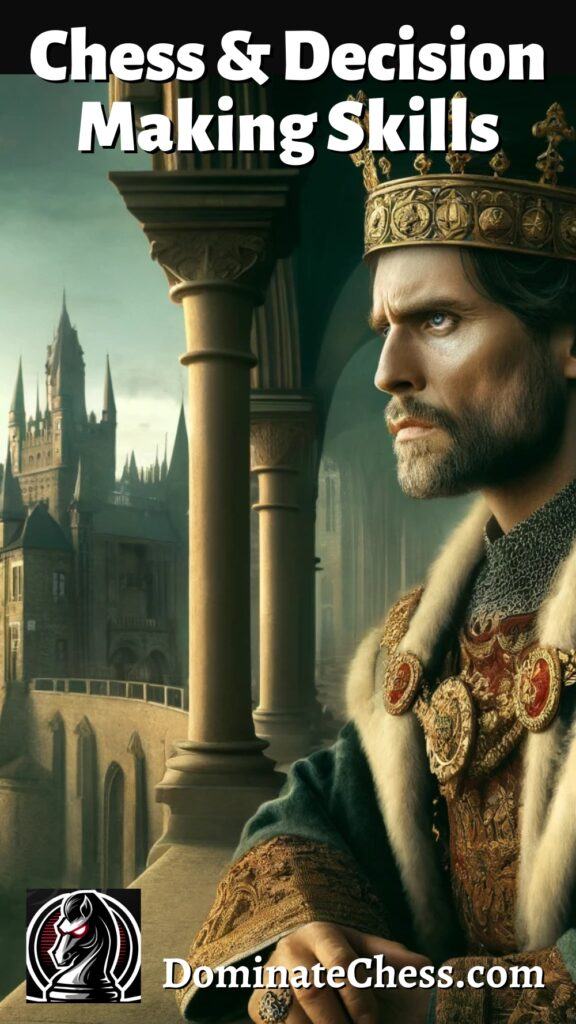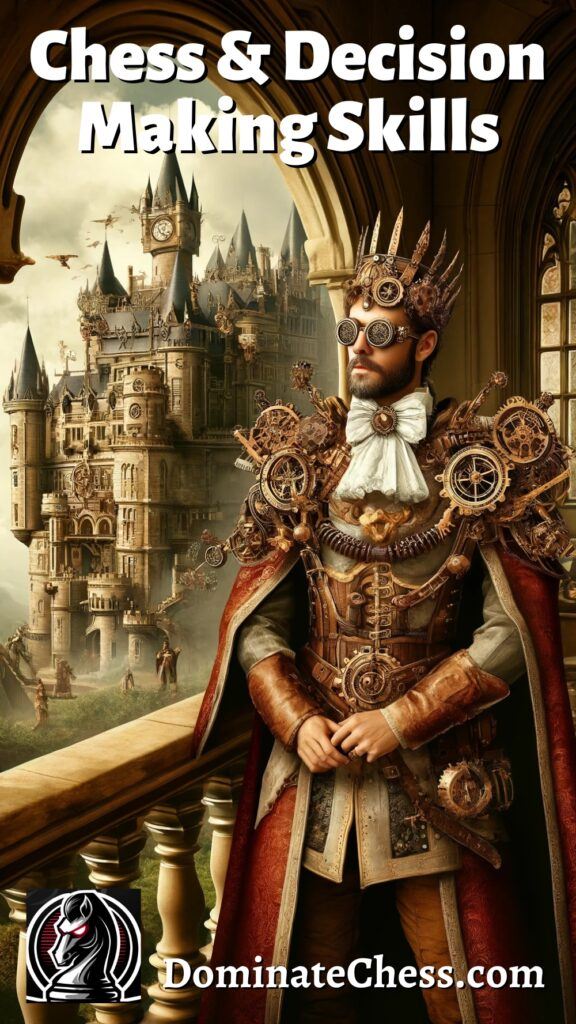Chess requires a blend of strategy, foresight, and critical thinking, all of which are huge when it comes to making informed decisions in life. Let’s talk about how chess isn’t just a beautiful game. It’s a powerful tool for honing your decision-making skills.
Does Chess Help With Decision Making?
Yes, chess significantly improves your decision-making skills. It teaches you to evaluate options, anticipate consequences, and make strategic choices under pressure, sharpening critical thinking.
The strategic nature behind the game of chess is undeniable. Every move you make offers a new problem to solve and another choice to be weighed. So how do we take those critical analytical skills and apply them to everyday situations? Let’s dive in!
Here’s a great video showcasing all the decision making that goes into just about every move on the chess board. It’s fascinating watching someone with such a great understanding of the game maneuver his pieces.
Do you have this kind of skill when making decisions in life away from the board?
Is Chess a Good Mental Exercise?
Think of your brain as a muscle that needs regular exercise to stay in shape. Just like weight training builds physical strength, playing chess is an excellent workout for the mind.
It’s globally accepted as a cerebral sport, challenging players to flex their mental muscles with each game. Every match is a new opportunity to push your boundaries and build on your problem-solving skills.
Each and every chess game is a form of mental resistance training. One of the aspects of chess I love the most (and why I’m so addicted to the game) is because every single game is 100% unique.
As you get deeper into each game, you’re forced to adapt your strategies on the fly. This not only sharpens your mind but it translates into a solid problem-solving approach in real life. You’re not just learning moves, you’re actually conditioning your brain to think several steps ahead.
Research has confirmed the cognitive benefits of playing chess. Studies like this one have linked regular chess playing with improved memory, better concentration, and an increased ability to think critically and logically.
As we know, decision making isn’t always about thinking several steps ahead, it’s sometimes about exercising patience. How do these congnitive gains we build in chess translate into exercising patience?
Does Chess Increase Patience?
The game of chess is a masterclass in emotional control. Hidden beneath the movements of pawns and knights is a powerful lesson in patience. Each player has to patiently wait, watch, and anticipate the opponent’s next few moves before even making their own. This kind of patience building is so important for sound decision-making.
Playing chess regularly teaches you very quickly that not every situation needs immediate action. Sometimes, the best move is to hold your position. Strategic patience like this actually trains you as a player to weigh the benefits of immediate gratification against long-term success.
It’s a fine line to walk. We all know that too much risk and over-aggressive play can lead to a quick loss. But also remember that too much caution leads to missed opportunities. Over time you learn when to strike with a well-planned gambit or to retreat and regroup for a better chance later.
And just like we do in chess, we all face decisions in real life that require a balance of courage, caution, and patience. Whether we’re navigating career choices, considering financial investments, or weighing personal relationships, these decisions can be just as intricate and as a mid-game chess position.
With both, acting too aggressively can spell trouble, while a well-timed move/decision can pave the way to success.
The ability to stay calm under pressure can define your success. Imagine you’re down to the last few seconds on the clock and your mind needs to stay clear to analyze the game and find that winning move. These moments on the chessboard are exactly where you learn to manage stress and make sound decisions when stakes are high.
The Psychology of Chess: Making Better Decisions Under Pressure
Let’s dive into chess psychology. Navigating the stressful environment of time-controlled and bullet matches can train you to manage anxiety and make sound decisions quickly.
The game of chess mirrors high-pressure situations you encounter at work and in your personal life. Think about all the times you’ve had just minutes to weigh your options and make a decision that impacted a project you were working on at the job. This practice of quick decision-making under stress is incredibly valuable, and it’s something you practice regularly in chess.
Every game of chess can feel like the final round of a championship. The decisions we make in these pressure-cooker scenarios often define success or failure.
Chess serves as a powerful metaphor for life’s unpredictabilities. It teaches you that even after a setback, the game isn’t over until it’s over. Resilience is about bouncing back from those poor decisions and missed opportunities, transforming what could be a crushing defeat into a lesson for future triumphs.
A study of competitive chess players revealed that they exhibited increased resilience and adaptability in their games, traits that spill over into their everyday decision-making.
Checkmate Your Indecision: Applying Chess Principles to Life Choices
Throughout the game of chess, every decision counts and this is just as true for life. Think of your long-term goals as your king – the piece you need to protect at all costs. Your short-term objectives? Those are your pawns and knights, valuable and strategic but ultimately serving to guard the most important aspects of your life and career.
This doesn’t mean you need to become a grandmaster to make wise choices. But taking a moment to reflect on your moves, considering potential outcomes, and planning several steps ahead will lead to better decisions.
Choose a scenario facing you right now. Picture it as a chessboard. Identify the players and possible moves. What are the risks? What are the rewards? Approach it with the same consideration and tactics you would in chess. This approach doesn’t guarantee a win every time, but you’re actively using a mindful strategy to your decision-making.
In my experience, when you apply chess strategies to life you tend to navigate all its complex situations with a sharper ability to anticipate future challenges.
Final Thoughts
Attack your decisions head on! Think of them like a chess board in front of you, and move forward with confidence. Remember, the most successful players are those who are strategic, patient, and willing to adapt.
What do you think? Have you ever thought about the principles of chess and how they apply to making big decisions? Let me know in the comments section below! I’d love to hear your perspective and I always reply!
Like This Article? Pin It!




This is a fantastic article highlighting the profound impact of chess on decision-making skills! I particularly enjoyed the sections on patience and resilience. It’s fascinating to think about how chess, a game often seen as purely recreational, can have such practical applications in our everyday lives.
You mention that chess improves patience and teaches emotional control. How long does it typically take for a novice player to notice these benefits?
Just as with any game, with a better understanding of the game along with experience, the game itself seems to slow down for you, which of course makes things so much easier on yourself and the moves and decisions you make. Thanks for the comment!
I have never thought about chess in this light but I think it is true that exercising your brain to problem solve as one does when playing chess will definitely assist with problem solving and real life situations. Are there any brain exercises or chess Apps or books you could recommend to help someone starting out in the game?
You can’t go wrong playing regularly. Chess.com is a spectacular app for playing against real players. Love it! Thanks for the comment!